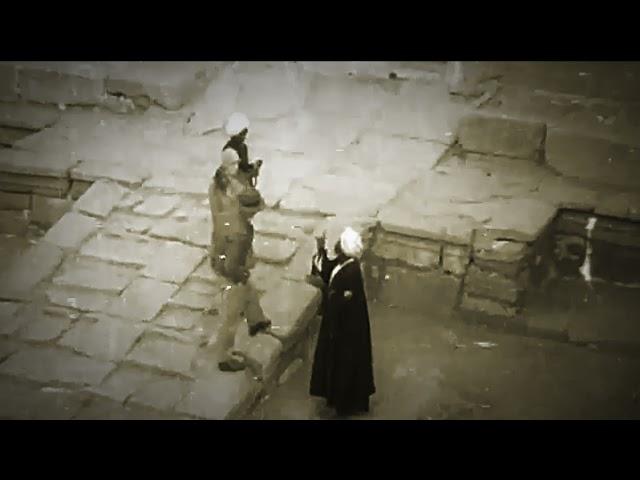
WUJIDAT - ABADIR and Pie Are Squared (Video)
ABADIR and Pie Are Squared: Wujidat
Akuphone AKU1032
Video by L'Aubaine
Songs:
Al-Anesa Malak - Ya Am Ya Khali
Laure Daccache - Munyati Ezz Istibari
Aziz Osman - Ansuna wa Taaloulna Tamalli
Recomposed by ABADIR & Pie Are Squared
Visit:
It’s 2120, it’s been 10 years since the WHO’s latest health guidelines signaled the end of music. Noises over 30 dB are no longer allowed, and global governments have imposed strict laws to ensure that these regulations are enforced. Noise detectors are now planted everywhere, and noise levels are subject to constant surveillance.
Talking is discouraged, yelling is a criminal offence, singing is now a foreign concept to younger generations. Courses designed to rid musicians and music lovers of their desire to sing or play instruments have been deemed a resounding success.
It must have been exciting for her to find this tape on a walk by the riverside, even though she had no idea what it was and how to use it. Many would have been tempted to discard it, probably rightly so, but Yolande Khouzam had been an Acoustics Researcher before the obsolescence of the entire discipline and this object seemed vaguely familiar to her.
We’re not sure if she managed to find a way to play it. If she did, it would’ve been badly mangled, the sounds at times completely indiscernible, especially towards the end of each side. We’re not sure if Arabic was one of the 4 remaining languages, if it was, she would be able to tell that these are songs from a completely different time, played with instruments that she hadn’t heard before. The music seemed to come from the same era, but as the mixtape progressed, the instrumentation, scales and sound seemed to gather a more western influence. Using whatever resources she could find, her research helped her trace most of the recordings and she dated them to the early 20th century, mostly between the 1920’s and 1940’s. She found that the change in sound, scales and instrumentation over the duration of the mixtape, with a more pronounced Western influence on the more recent songs could be attributed to a Congress of Arab Music that reportedly had been held in Cairo in 1932 under the patronage of King Fuad I. That remains only a guess for now.
While no legible writings were found on the cassette tape, she did find an archived online review of a mixtape released almost a century before her time which seemed to contain something very similar to the tape she found. The tape, titled Wujidat w as made by Egyptian musicians ABADIR and Pie Are Squared to experiment with dissecting and degrading traditional Egyptian songs by known and unknown artists. What Yolande might have assumed was a mixtape made to provoke nostalgia, was almost the exact opposite of that. What made it even more intriguing is that the mixtape she found had been intentionally made to sound broken and degraded.
Akuphone AKU1032
Video by L'Aubaine
Songs:
Al-Anesa Malak - Ya Am Ya Khali
Laure Daccache - Munyati Ezz Istibari
Aziz Osman - Ansuna wa Taaloulna Tamalli
Recomposed by ABADIR & Pie Are Squared
Visit:
It’s 2120, it’s been 10 years since the WHO’s latest health guidelines signaled the end of music. Noises over 30 dB are no longer allowed, and global governments have imposed strict laws to ensure that these regulations are enforced. Noise detectors are now planted everywhere, and noise levels are subject to constant surveillance.
Talking is discouraged, yelling is a criminal offence, singing is now a foreign concept to younger generations. Courses designed to rid musicians and music lovers of their desire to sing or play instruments have been deemed a resounding success.
It must have been exciting for her to find this tape on a walk by the riverside, even though she had no idea what it was and how to use it. Many would have been tempted to discard it, probably rightly so, but Yolande Khouzam had been an Acoustics Researcher before the obsolescence of the entire discipline and this object seemed vaguely familiar to her.
We’re not sure if she managed to find a way to play it. If she did, it would’ve been badly mangled, the sounds at times completely indiscernible, especially towards the end of each side. We’re not sure if Arabic was one of the 4 remaining languages, if it was, she would be able to tell that these are songs from a completely different time, played with instruments that she hadn’t heard before. The music seemed to come from the same era, but as the mixtape progressed, the instrumentation, scales and sound seemed to gather a more western influence. Using whatever resources she could find, her research helped her trace most of the recordings and she dated them to the early 20th century, mostly between the 1920’s and 1940’s. She found that the change in sound, scales and instrumentation over the duration of the mixtape, with a more pronounced Western influence on the more recent songs could be attributed to a Congress of Arab Music that reportedly had been held in Cairo in 1932 under the patronage of King Fuad I. That remains only a guess for now.
While no legible writings were found on the cassette tape, she did find an archived online review of a mixtape released almost a century before her time which seemed to contain something very similar to the tape she found. The tape, titled Wujidat w as made by Egyptian musicians ABADIR and Pie Are Squared to experiment with dissecting and degrading traditional Egyptian songs by known and unknown artists. What Yolande might have assumed was a mixtape made to provoke nostalgia, was almost the exact opposite of that. What made it even more intriguing is that the mixtape she found had been intentionally made to sound broken and degraded.
Комментарии:

@janzenrollo8923 - 07.05.2021 11:54
Absolutely intriguing. Bought both the tape and the CDr in a sec on bandcamp. Hopefully an LP will follow some day.
Ответить
САМЫЕ КОЛХОЗНЫЕ ПЛИТКИ ДЛЯ ИНТЕРЬЕРА
ТАТЬЯНА БЕЗВЕРХАЯ: о дизайне и ремонте
DJI Rs2 vs Rs3 Pro: Ultimate Comparison Guide
Joel Varughese


























